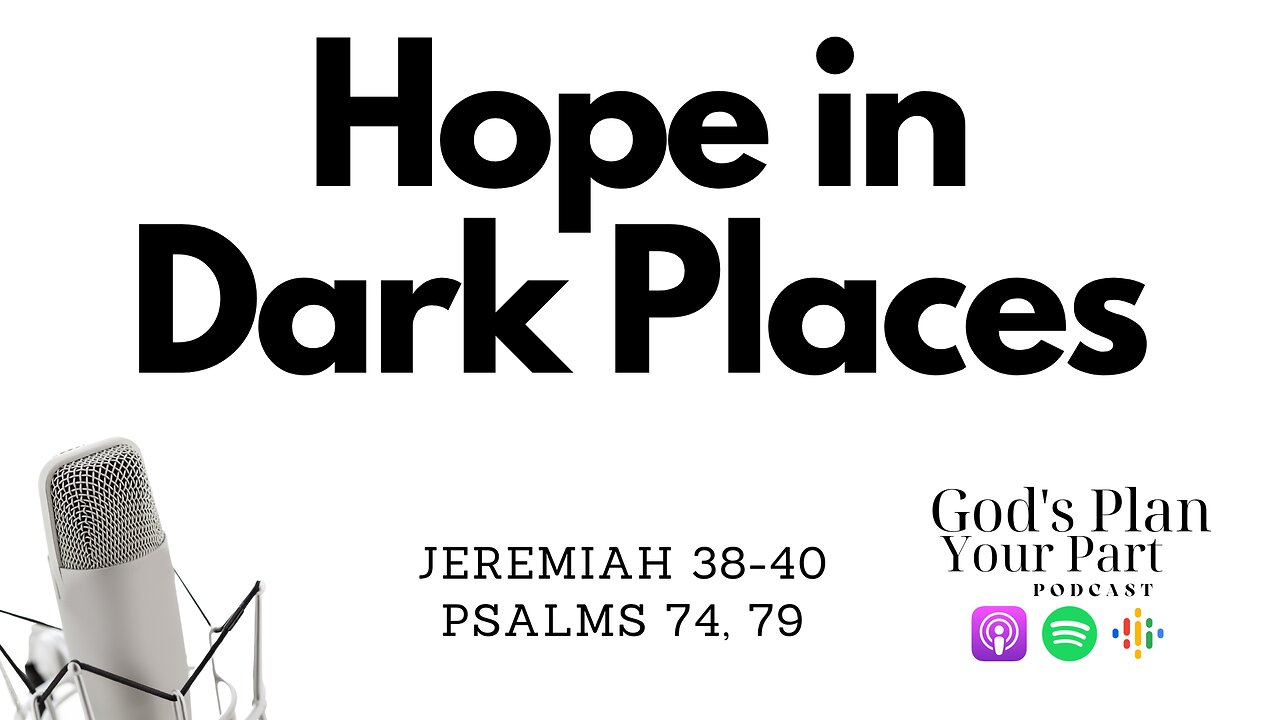Premium Only Content

Jeremiah 38-40, Psalms 74, 79 | Jeremiah's Perseverance: From Cistern to Redemption
For today's full reading download the full podcast.
Listen on Apple Podcasts: https://podcasts.apple.com/us/podcast/gods-plan-your-part/id1662005086
Listen on Spotify: https://open.spotify.com/show/2IjaYq4cYgy8WIcw5zWj9g
Listen on Google Podcasts: https://podcasts.google.com/feed/aHR0cHM6Ly9mZWVkcy5idXp6c3Byb3V0LmNvbS8yMTA1NzUyLnJzcw==
Instagram: https://www.instagram.com/godsplanyourpart/
Facebook: https://www.facebook.com/godsplanyourpart/
Support the Show: https://www.buzzsprout.com/2105752/support
Contact us: godsplanyourpart@gmail.com
#podcast #God #dailybible #bibleinayear #dailybiblepodcast #christianity #faith #bible #love #christian #biblestudy #bibleverse #scripture #godsplanyourpart
In Jeremiah 38-40, we witness the tumultuous journey of the prophet Jeremiah during the harrowing period of Babylonian captivity. Jeremiah's unwavering commitment to delivering God's messages puts him in a perilous situation. King Zedekiah, influenced by his officials, imprisons Jeremiah in a cistern as a result of his prophecies. However, Ebed-Melech, a loyal Ethiopian servant, intervenes and rescues Jeremiah from the cistern. The themes of persecution, imprisonment, and deliverance are prominent here. Jeremiah's continued prophetic calling results in predicting the fall of Jerusalem, urging King Zedekiah to surrender to the Babylonians. Following Jerusalem's capture, Gedaliah becomes governor, but his rule is tragically cut short when he is assassinated by Ishmael. Amidst the chaos, the remnant considers fleeing to Egypt and seeks Jeremiah's guidance. This sequence of events underscores the themes of faithfulness, repentance, and the consequences of disobedience.
Psalm 74, attributed to Asaph, reflects the devastation following Jerusalem's fall and the subsequent desecration of the temple by adversaries. The psalmist's sorrowful lamentation highlights the deep emotional impact of witnessing God's sanctuary in ruins. Asaph vividly portrays God's enemies triumphing and boasts about their actions in God's holy place. This Psalm touches on themes of God's anger, national lament, and the importance of seeking God's intervention. The psalmist pleads with God to remember His covenant and to arise in defense of His people, appealing to the tags "Temple desecration" and "God's mercy." The psalm concludes with a fervent prayer for God to redeem His people from oppression and to restore the sanctuary, which encapsulates the themes of restoration and divine deliverance.
Psalm 79, another composition attributed to Asaph, continues the themes of national lament and divine intervention. The psalmist mourns the desolation of Jerusalem, which has become a scene of destruction and disgrace. The enemies have defiled the holy temple and laid waste to the city, leading to a cry for God's mercy and the theme of God's anger. The psalmist appeals to God's compassion, invoking the plea for redemption based on God's reputation among the nations. Similar to Psalm 74, the psalmist seeks divine intervention and justice, reminding God of His covenant. This psalm reflects themes of destruction, lament, and the enduring hope for God's restoration and protection.
These summaries encapsulate the key themes and events within Jeremiah 38-40, Psalm 74, and Psalm 79, incorporating the relevant tags to provide a comprehensive understanding of each chapter's content.
-
 23:20
23:20
Gods Plan Your Part
5 months ago1 Timothy 5 | Building a Church That LASTS for Generations
391 -
 25:02
25:02
marcushouse
12 hours ago $12.36 earnedStarship Just Exploded 💥 What Went Wrong This Time?!
25.3K10 -
 12:00
12:00
Silver Dragons
18 hours agoBullion Dealer Reveals Best Silver to Buy With $1,000
10.1K2 -
 12:58
12:58
NinjaGamblers
3 hours ago $3.37 earnedIs This The BEST Way to Win At Roulette? 😲
20.6K2 -
 1:01:54
1:01:54
CharLee Simons Presents Do Not Talk
2 days agoCALIFORNIA'S DONE!
9.5K4 -
 7:33
7:33
MudandMunitions
20 hours agoUnboxing My FIRST Revolver! Smith & Wesson 442 .38 Special and What’s Coming Next for the Channel
18K2 -
 1:01:05
1:01:05
Trumpet Daily
1 day ago $4.15 earnedGermany Started Two World Wars and Now Wants Nuclear Weapons - Trumpet Daily | Mar. 7, 2025
14K29 -
 57:07
57:07
Stephen Gardner
17 hours ago🚨BREAKING: Musk STUNS even Trump with LATEST FRAUD DISCOVERY!!
118K253 -
 2:26:47
2:26:47
FreshandFit
13 hours agoRatchet Chick Gets Kicked Out "Gracefully" For THIS...
123K157 -
 2:05:17
2:05:17
TimcastIRL
16 hours agoDemocrat ACTBLUE In CHAOS, Theories Over DOGE Cutting SLUSH FUND Go Wild w/Hotep Jesus | Timcast IRL
255K226